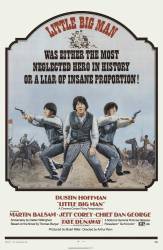Revealing mistake: During the Little Bighorn massacre one of Custer's lieutenants turns to address Custer and is struck in the back with an arrow, and the thick pad or board is visible under the actor's shirt.
Factual error: The worst historical distortions in this film must concern legendary "Wild Bill" Hickock. First of all he wasn't killed by a teenage boy, but one John McCall, a man in his 30's. McCall sneaked behind Hickock who was in the middle of a poker game and shot him through the head killing him instantly. Secondly this took place on August 2 1876, about five weeks AFTER the Custer's Last Stand. (01:46:30)
Continuity mistake: When Jack and Mrs. Pendrake meet in the whorehouse and talk through a screen of glass beads, Jack is standing very close to the screen, that's why it's out of focus when the camera is on her "looking through his eyes". However, in one shot it's not, and that looks quite strange because Jack hasn't moved away from the screen. (01:46:35)
Continuity mistake: When the coach with Jack and Olga is chased by Indians the man on the coach box killed by an arrow in his back disappears and reappears. (00:50:25)
Visible crew/equipment: During the battle at Little Big Horn, just before Custer shouts "Fools, shooting their own horses." there is soldier holding his horse, and there is a long rope running horizontally across the screen keeping the horse in place. (02:01:00)
Audio problem: After the children have been kidnapped by the Cheyenne they are sitting in a tee pee discussing the odds of Caroline getting raped. When she says "no such luck for me" the camera cuts close to her at the end of the sentence, and her mouth isn't moving anymore. (00:08:55)






Answer: Some members of tribes like the Cheyenne joined in the 'modern' world to some extent, using guns and even putting on Western clothes and eating Western food. While nowhere near the technological nous of the white settlers, the natives were far from being hunter gatherers at this point.